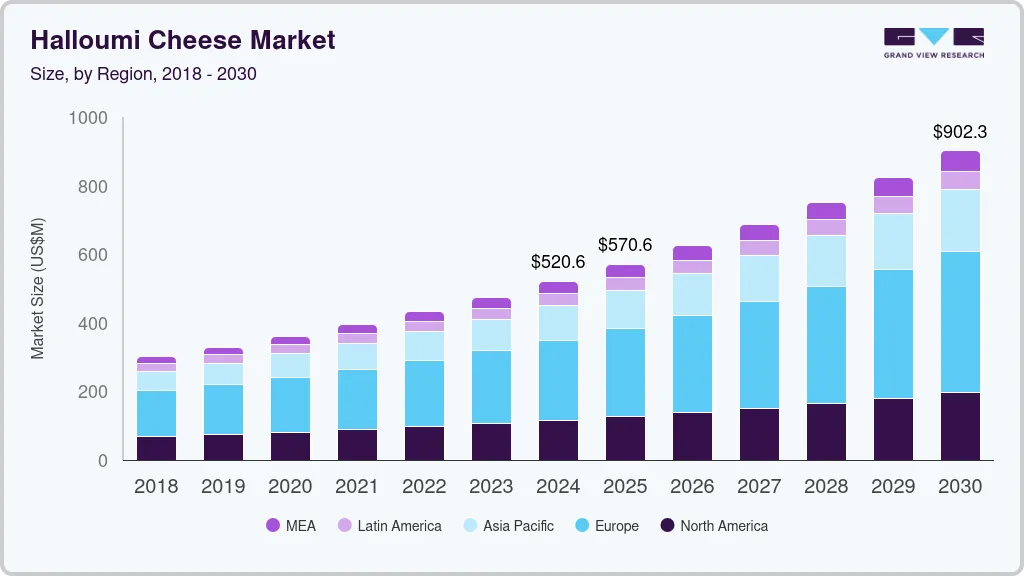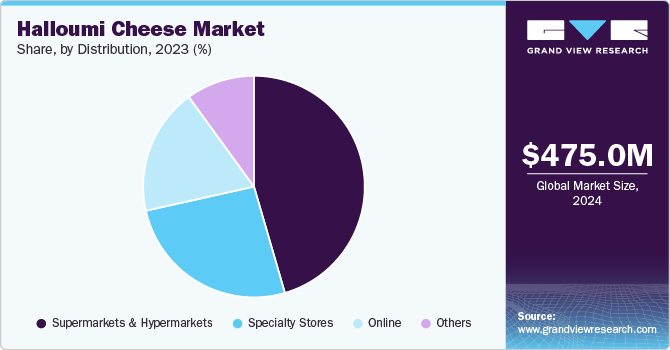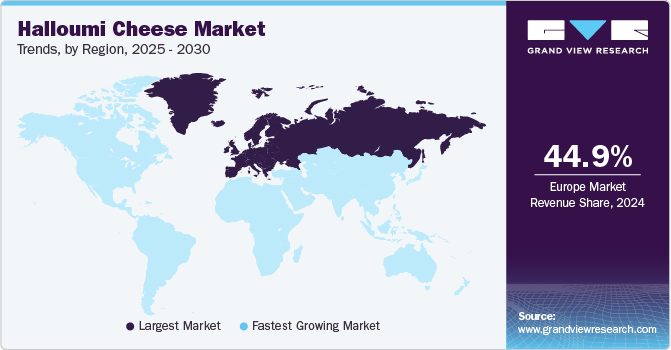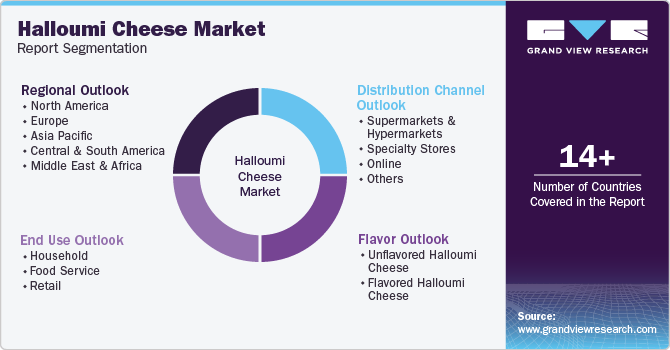- Home
- »
- Consumer F&B
- »
-
Halloumi Cheese Market Size, Share, Industry Report, 2030GVR Report cover
![Halloumi Cheese Market Size, Share & Trends Report]()
Halloumi Cheese Market (2025 - 2030) Size, Share & Trends Analysis Report By Flavor (Flavored, Unflavored), By End Use (Household, Food Service, Retail), By Distribution Channel (Supermarkets & Hypermarkets, Specialty Stores, Online), By Region, And Segment Forecasts
- Report ID: GVR-4-68040-504-7
- Number of Report Pages: 80
- Format: PDF
- Historical Range: 2018 - 2023
- Forecast Period: 2025 - 2030
- Industry: Consumer Goods
- Report Summary
- Table of Contents
- Interactive Charts
- Methodology
- Download FREE Sample
-
Download Sample Report
Halloumi Cheese Market Size & Trends
The global halloumi cheese market size was estimated at USD 520.6 million in 2024 and is expected to expand at a CAGR of 9.6% from 2025 to 2030. Halloumi cheese is a semi-hard cheese originating from Cyprus and has recently gained significant popularity. Traditionally made from a blend of sheep's and goat's milk, it is characterized by its unique squeaky texture and high melting point, which allows it to be grilled or fried without losing its shape. Halloumi has deep roots in the Mediterranean diet and culture, serving as a staple food for centuries. Its versatility in culinary applications and a growing global interest in Mediterranean cuisine have contributed to its rise in demand.

One of the primary reasons for the growth of halloumi cheese is the increasing consumer demand for protein-rich foods. As health consciousness rises, more people seek alternatives to meat that still provide substantial protein content. Halloumi is an excellent vegetarian option, making it appealing to vegetarians and flexitarians alike. The fast-food industry's pivot towards healthier offerings has also spurred interest in halloumi as a meat substitute in various dishes, such as salads and sandwiches.
The globalization of food culture significantly influences Halloumi's growth trajectory. As consumers become more adventurous with their food choices, there is a rising interest in exotic cuisines, particularly Mediterranean dishes that prominently feature halloumi. This trend is further amplified by the expansion of multinational food chains and the proliferation of e-commerce platforms that make diverse food products more accessible to consumers around the world.
Another contributing factor is the innovation in packaging and marketing strategies to enhance consumer awareness and convenience. Producers invest in attractive packaging and precise labeling to highlight halloumi's nutritional benefits and culinary versatility. Additionally, the rise of food delivery services has made it easier for consumers to try new products like halloumi without visiting specialty stores.
Sustainability and ethical sourcing have also become crucial considerations for modern consumers. Many producers are adopting artisanal methods of production that emphasize local sourcing and traditional techniques. This aligns with a broader consumer shift towards sustainable eating practices, where individuals prioritize foods produced responsibly and ethically. The connection to local heritage and authenticity appeals to consumers looking for genuine culinary experiences.
Finally, the market dynamics surrounding halloumi cheese reflect broader trends within the dairy industry. With an increasing number of health-conscious consumers seeking flavorful options to enhance their meals, halloumi is positioned well within this niche. Its ability to complement various dishes-from grilled vegetables to pizza-makes it a versatile ingredient catering to diverse palates. This adaptability ensures that halloumi remains relevant in a rapidly evolving food landscape.
One of the most pressing challenges is the intense competition within the cheese market. With over 500 varieties of specialty cheeses available globally and a market valued at over USD 50 billion, halloumi cheese must contend with well-established cheeses like feta, gouda, and brie, with strong consumer followings. The introduction of numerous new specialty cheese products each year further complicates the landscape, making it crucial for halloumi producers to differentiate their offerings through innovative marketing strategies and product variations.
Regulatory challenges also pose a significant hurdle for the halloumi market. The debates surrounding its Protected Designation of Origin (PDO) status can create legal complexities for producers outside Cyprus who wish to market their products as halloumi. This situation can lead to confusion among consumers and may restrict the market's growth potential in regions where local cheese varieties are preferred. Ensuring compliance with these regulations while maintaining product authenticity is a delicate balance for manufacturers.
Flavor Insights
Unflavored halloumi cheeses were the most significant product in the halloumi cheese industry, accounting for a market of 312.08 million in 2023. Unflavored halloumi cheese is experiencing substantial growth, primarily due to its versatility and authentic taste. This traditional variant is cherished for complementing a wide range of dishes without overpowering other flavors, making it a staple in Mediterranean and Middle Eastern cuisines. The increasing global interest in ethnic foods and authentic culinary experiences has fueled the demand for unflavored halloumi. Its popularity in fast food outlets and restaurants, often used as a protein-rich ingredient in salads, sandwiches, and grilled dishes, contributes to its robust market presence.
Unflavored halloumi cheese is also witnessing growth, albeit at a moderate pace compared to its unflavored counterpart. The market is expected to grow at a CAGR of 9.5% from 2024 to 2030. Introducing various flavor profiles-such as chili, mint, and smoked varieties-has attracted consumers seeking novel taste experiences. As the food industry evolves, restaurants and cafes are increasingly experimenting with flavored halloumi to offer unique dishes that appeal to adventurous eaters. This trend aligns with the broader consumer shift towards diverse culinary experiences, driving the demand for flavored options. Additionally, innovations in packaging and marketing strategies are helping producers reach a wider audience, enhancing the visibility of flavored halloumi in retail settings and online platforms.
End Use Insights
Household consumption of halloumi cheese accounted for a market of over USD 245 million in 2023. The household end-use accounts for a significant share due to the increasing demand for convenient and versatile food options among home cooks. Consumers increasingly choose premium products like halloumi to enhance their everyday meals and entertain guests. Its adaptability across various cuisines and high protein content makes it a favored choice in households. This segment is expected to grow as more consumers embrace cooking at home and seek quality ingredients to elevate their culinary experiences.
In addition to the household segment, the food service industry is also a crucial player in the market. Restaurants and cafes are incorporating halloumi into their menus, leveraging its unique texture and flavor to create appealing dishes that cater to health-conscious diners. The growing popularity of Mediterranean cuisine has further propelled the demand for halloumi in food service settings as chefs experiment with this versatile cheese in salads, grilled dishes, and appetizers. As more establishments recognize the appeal of halloumi among consumers looking for healthier options, this segment is poised for continued growth alongside the household market.
The retail segment is another vital component of the halloumi cheese industry, contributing significantly to overall sales. With the rise of grocery shopping trends emphasizing convenience and quality, retailers are increasingly stocking various halloumi products to meet consumer demand. Supermarkets and specialty stores often feature unflavored and flavored halloumi options, catering to diverse consumer preferences. Expanding e-commerce platforms has also made it easier for consumers to purchase halloumi online, further driving sales in this segment. As awareness of halloumi grows and more consumers seek out unique cheese options, the retail segment is expected to experience robust growth in the coming years.
Distribution Channel Insights
Supermarkets & hypermarkets have the highest revenue share in the distribution of halloumi cheeses, accounting for a market revenue of USD 216.32 million in 2023. The appeal of these large retail formats lies in their ability to offer a diverse range of halloumi products from various brands, allowing consumers to compare options easily. The tactile experience of physically inspecting the cheese-assessing its freshness, texture, and packaging-plays a crucial role in consumer decision-making. Research indicates that 68% of cheese purchases occur in-store, with 80% of shoppers prefer buying cheese in person to evaluate quality. Supermarkets and hypermarkets capitalize on this preference through strategic product placement and promotions encouraging impulse buying. Moreover, these stores' expanding gourmet and specialty cheese sections cater to the increasing consumer demand for premium products, including organic and flavored halloumi options.
Specialty stores also contribute significantly to the growth of offline sales of halloumi cheese. These retail outlets focus on providing high-quality and artisanal products, appealing to consumers who prioritize authenticity and unique culinary experiences. Specialty stores often feature locally sourced or imported halloumi varieties, enhancing their appeal among food enthusiasts seeking distinctive flavors and textures. The emphasis on customer experience is paramount in specialty stores; many offer cheese-sampling events and expert recommendations that enhance consumer engagement and drive sales. Approximately 55% of customers cite in-store experiences as crucial for discovering new cheese varieties, underscoring the importance of specialty stores in promoting halloumi. Additionally, these retailers often emphasize the cultural heritage of halloumi, linking it to Mediterranean cuisine through themed promotions and events that resonate with consumers' growing interest in global flavors.

Online sales of halloumi cheeses are expected to grow at a CAGR of 10.2% from 2024 to 2030. Online retail is emerging as the fastest-growing distribution channel for halloumi cheese. The increasing popularity of e-commerce has made it easier for consumers to access a diverse range of halloumi products from various brands and regions. This convenience appeals to consumers seeking specialty products that may not be readily available in local stores. The shift towards online shopping has been accelerated by changing consumer behaviors, particularly post-COVID-19, as more people have become accustomed to purchasing groceries online. As a result, online retail is expected to experience significant growth in the coming years, catering to consumers' evolving preferences.
Regional Insights
The North America halloumi cheese market was USD 105.69 million in 2023 and is expected to grow at a CAGR of 9.4% over the forecast period. The growth of halloumi cheese in North America is primarily driven by the increasing popularity of Mediterranean diets and the rising demand for protein-rich vegetarian options. As consumers become more health-conscious, halloumi's high protein content and unique grilling properties make it an attractive alternative to meat, particularly for flexitarians and vegetarians. The food and beverage industry is also experiencing substantial growth, with restaurants and cafes incorporating halloumi into diverse menus, appealing to food enthusiasts seeking innovative dishes. Furthermore, advancements in packaging technology have improved product quality and self-life, making halloumi more accessible to consumers.
U.S. Halloumi Cheese Market Trends
The U.S. halloumi cheese market is expected to grow at a CAGR of 7% from 2024 to 2030. A growing consumer preference for fresh and organic products has spurred interest in home juicing. Many consumers are willing to pay a premium for high-quality, nutrient-dense juices from fresh fruits and vegetables. This trend is further supported by the popularity of cold-pressed juices, which retain more nutrients than traditional juicing methods, appealing to health-conscious individuals.
Europe Halloumi Cheese Market Trends
The Europe halloumi cheese market benefits from its cultural roots and widespread acceptance as a staple in Mediterranean cuisine. The region accounts for over 45% of the global market share due to high consumer awareness and strong production capabilities in countries like Cyprus and Greece. The increasing adoption of Mediterranean diets, which emphasize plant-based foods and healthy eating habits, further drives the demand for halloumi as a protein source. Additionally, the rise of artisanal and premium dairy products has led consumers to seek out high-quality cheeses like halloumi, often marketed for its unique flavor and texture. As culinary trends continue to evolve towards health-conscious choices, the European market for halloumi cheese is expected to maintain its dominance and grow steadily.

Asia Pacific Halloumi Cheese Market Trends
Asia Pacific halloumi cheese market accounted for approximately 20% of the global market in 2023. The growth of halloumi cheese is fueled by the globalization of food culture and increasing interest in diverse culinary experiences. As more consumers in countries like Australia and New Zealand explore international cuisines, halloumi has gained traction as a versatile ingredient that can be used in various dishes-from salads to grilled meals. The rising trend of vegetarianism and flexitarianism among consumers seeking healthier options also contributes to the demand for halloumi as a meat substitute. Additionally, expanding retail chains and e-commerce platforms has made it easier for consumers to access specialty products like halloumi, further driving market growth. This combination of factors positions the Asia-Pacific region as an emerging market for halloumi cheese, with significant potential for future expansion.
Key Halloumi Cheese Company Insights
The competitive landscape of the halloumi cheese industry is characterized by a mix of traditional producers and large dairy corporations, reflecting a dynamic environment driven by evolving consumer preferences and increasing demand for specialty cheeses. Key players in the market include established companies such as Almarai, Arla Foods, and Petrou Bros Dairy Products, which leverage their extensive distribution networks and brand recognition to capture significant market share. These companies are actively expanding their product lines to include flavored and organic options, catering to consumers' growing interest in health-conscious and gourmet food choices. The emphasis on quality, authenticity, and unique culinary applications has allowed these brands to differentiate themselves in a crowded marketplace.
Key Halloumi Cheese Companies:
The following are the leading companies in the halloumi cheese market. These companies collectively hold the largest market share and dictate industry trends.
- Petrou Bros Dairy Products
- Zita Dairies
- Pittas Dairy Industries
- Uhrenholt
- Hadjipieris
- Arla Foods
- Dafni Dairy
- Nordex Food
- Achnagal Dairies
- Lefkonitziatis Dairy Products
- Olympus Cheese
- Almarai
- High Weald Dairy
- Charalambides Christis
- Pandelyssi
Halloumi Cheese Market Report Scope
Report Attribute
Details
Market size value in 2025
USD 570.6 million
Revenue forecast in 2030
USD 902.3 million
Growth rate (Revenue)
CAGR of 9.6% from 2025 to 2030
Actuals
2018 - 2023
Forecast period
2025 - 2030
Quantitative units
Revenue in USD million, and CAGR from 2025 to 2030
Report Coverage
Revenue forecast, company ranking, competitive landscape, growth factors, and trends
Segments Covered
Flavor, End Use, Distribution and Region
Regional scope
North America; Europe; Asia Pacific; Central & South America; Middle East & Africa
Country scope
U.S, Canada, Mexico, Germany, U.K., France, Italy, Spain, China, Japan, India, Australia & New Zealand, South Korea, Brazil, UAE
Key companies profiled
Petrou Bros Dairy Products; Zita Dairies; Pittas Dairy Industries; Uhrenholt; Hadjipieris; Arla Foods; Dafni Dairy; Nordex Food; Achnagal Dairies; Lefkonitziatis Dairy Products; Olympus Cheese; Almarai; High Weald Dairy; Charalambides Christis; Pandelyssi
Customization scope
Free report customization (equivalent up to 8 analysts working days) with purchase. Addition or alteration to country, regional & segment scope.
Pricing and purchase options
Avail customized purchase options to meet your exact research needs. Explore purchase options Global Halloumi Cheese Market Report Segmentation
This report forecasts revenue growth at the global, regional, and country levels and provides an analysis of the latest industry trends and opportunities in each of the sub-segments from 2018 to 2030. For this study, Grand View Research has segmented the global halloumi cheese market report based on flavor, end use, distribution channel and region:

-
End Use Outlook (Revenue, USD Million, 2018 - 2030)
-
Household
-
Food Service
-
Retail
-
-
Flavor Outlook (Revenue, USD Million, 2018 - 2030)
-
Unflavored Halloumi Cheese
-
Flavored Halloumi Cheese
-
-
Distribution Channel Outlook (Revenue, USD Million, 2018 - 2030)
-
Supermarkets & Hypermarkets
-
Specialty Stores
-
Online
-
Others
-
-
Regional Outlook (Revenue, USD Million, 2018 - 2030)
-
North America
-
U.S.
-
Canada
-
Mexico
-
-
Europe
-
Germany
-
U.K.
-
France
-
Italy
-
Spain
-
-
Asia Pacific
-
China
-
Japan
-
India
-
Australia & New Zealand
-
South Korea
-
-
Central & South America
-
Brazil
-
-
Middle East & Africa
-
UAE
-
-
Frequently Asked Questions About This Report
b. The global halloumi cheese market was valued at USD 475.0 million in 2023 and is expected to reach USD 520.6 million in 2024.
b. The global halloumi cheese market is expected to expand at a compound annual growth rate (CAGR) of 9.6% from 2024 to 2030 to reach USD 902.3 million by 2030.
b. Unflavored halloumi cheeses were the most significant product in the halloumi cheese market, accounting for a market of 312.08 million in 2023. Unflavored halloumi cheese is experiencing substantial growth, primarily due to its versatility and authentic taste. This traditional variant is cherished for complementing a wide range of dishes without overpowering other flavors, making it a staple in Mediterranean and Middle Eastern cuisines.
b. Some of the key players operating in the market include Petrou Bros Dairy Products; Zita Dairies; Pittas Dairy Industries; Uhrenholt; Hadjipieris; Arla Foods; Dafni Dairy; Nordex Food; Achnagal Dairies; Lefkonitziatis Dairy Products; Olympus Cheese; Almarai; High Weald Dairy; Charalambides Christis; Pandelyssi
b. Halloumi cheese is a semi-hard cheese originating from Cyprus and has recently gained significant popularity. Traditionally made from a blend of sheep's and goat's milk, it is characterized by its unique squeaky texture and high melting point, which allows it to be grilled or fried without losing its shape. Halloumi has deep roots in the Mediterranean diet and culture, serving as a staple food for centuries. Its versatility in culinary applications and a growing global interest in Mediterranean cuisine have contributed to its rise in demand.
Share this report with your colleague or friend.
Need a Tailored Report?
Customize this report to your needs — add regions, segments, or data points, with 20% free customization.

ISO 9001:2015 & 27001:2022 Certified
We are GDPR and CCPA compliant! Your transaction & personal information is safe and secure. For more details, please read our privacy policy.
Trusted market insights - try a free sample
See how our reports are structured and why industry leaders rely on Grand View Research. Get a free sample or ask us to tailor this report to your needs.










